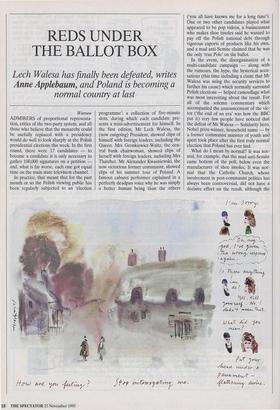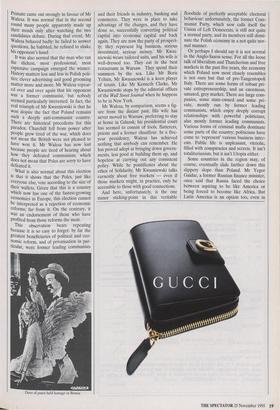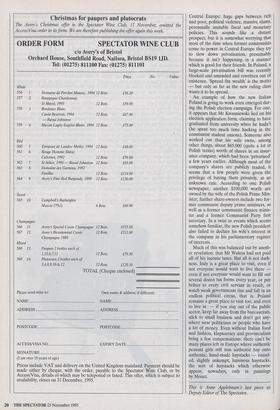REDS UNDER THE BALLOT BOX
Lech Walesa has finally been defeated, writes Anne Applebaum, and Poland is becoming a
normal country at last
Warsaw ADMIRERS of proportional representa- tion, critics of the two-party system, and all those who believe that the monarchy could be usefully replaced with a presidency would do well to look sharply at the Polish presidential elections this week. In the first round, there were 17 candidates — to become a candidate it is only necessary to gather 100,000 signatures on a petition and, what is far worse, each one got equal time on the main state television channel.
In practice, that meant that for the past month or so the Polish viewing public has been regularly subjected to an 'election
programme': a collection of five-minute slots, during which each candidate pre- sents a mini-advertisement for himself. In the first edition, Mr Lech Walesa, the (now outgoing) President, showed clips of himself with foreign leaders, including the Queen. Mrs Gronkiewicz-Waltz, the cen- tral bank chairwoman, showed clips of herself with foreign leaders, including Mrs Thatcher. Mr Alexander Kwasniewski, the now victorious former communist, showed clips of his summer tour of Poland. A famous cabaret performer explained in a perfectly deadpan voice why he was simply a better human being than the others
(`you all have known me for a long time'). One or two other candidates played what appeared to be pop videos, a businessman who makes shoe insoles said he wanted to pay off the Polish national debt through vigorous exports of products like his own, and a mad anti-Semite claimed that he was the only 'true Pole' on the ballot.
In the event, the disorganisation of a multi-candidate campaign — along with the rumours, the hype, the hysterical accu- sations (this time including a claim that Mr Walesa was using the security services to further his cause) which normally surround Polish elections — helped camouflage what was most interesting about the result. For all of the solemn commentary which accompanied the announcement of the vic- tor (`the end of an era' was how the BBC put it) very few people have noticed that the defeat of Mr Walesa — Solidarity hero, Nobel prize-winner, household name — by a former communist minister of youth and sport took place after the first truly normal election that Poland has ever had.
What do I mean by normal? It was nor- mal, for example, that the mad anti-Semite came bottom of the poll, below even the manufacturer of shoe insoles. It was nor- mal that the Catholic Church, whose involvement in post-communist politics has always been controversial, did not have a decisive effect on the result, although the Primate came out strongly in favour of Mr Walesa. It was normal that in the second round many people apparently made up their minds only after watching the two candidates debate. During that event, Mr Walesa behaved badly: he failed to answer questions, he babbled, he refused to shake his opponent's hand.
It was also normal that the man who ran the slickest, most professional, most expensive campaign emerged the winner. History matters less and less in Polish poli- tics; clever advertising and good grooming matter more and more. Mr Walesa repeat- ed over and over again that his opponent was a former communist, but nobody seemed particularly interested. In fact, the real triumph of Mr Kwasniewski is that he won despite the fact that Poland remains such a deeply anti-communist country. There are historical precedents for this paradox. Churchill fell from power after people grew tired of the war, which does not mean the British were not pleased to have won it. Mr Walesa has now lost because people are tired of hearing about how they defeated communism, which does not mean that Poles are sorry to have defeated it.
What is also normal about this election is that it shows that the Poles, just like everyone else, vote according to the size of their wallets. Given that this is a country which now has one of the fastest-growing economies in Europe, this election cannot be interpreted as a rejection of economic reforms; far from it. On the contrary, it was an endorsement of those who have profited from those reforms the most.
This observation bears repeating because it is so easy to forget: by far the greatest beneficiaries of political and eco- nomic reform, and of privatisation in par- ticular, were former leading communists
Dove of peace held hostage in Bosnia
and their friends in industry, banking and commerce. They were in place to take advantage of the changes, and they have done so, successfully converting political capital into economic capital and back again. They are now the party of prosperi- ty; they represent big business, serious investment, serious money. Mr Kwas- niewski wears tailored suits, and his wife is well-dressed too. They eat in the best restaurants in Warsaw. They spend their summers by the sea. Like Mr Boris Yeltsin, Mr Kwasniewski is a keen player of tennis. Like Mr Kenneth Clarke, Mr Kwasniewski stops by the editorial offices of the Wall Street Journal when he happens to be in New York.
Mr Walesa, by comparison, seems a fig- ure from the distant past. His wife has never moved to Warsaw, preferring to stay at home in Gdansk; his presidential court has seemed to consist of fools, flatterers, priests and a former chauffeur. In a five- year presidency, Walesa has achieved nothing that anybody can remember. He has proved adept at bringing down govern- ments, less good at building them up, and hopeless at carrying out any consistent policy. While he pontificates about the ethos of Solidarity, Mr Kwasniewski talks earnestly about free markets — even if those markets might, in practice, only be accessible to those with good connections.
And here, unfortunately, is the one minor sticking-point in this veritable floodtide of perfectly acceptable electoral behaviour: unfortunately, the former Com- munist Party, which now calls itself the Union of Left Democrats, is still not quite a normal party, and its members still domi- nate the Polish economy in a not quite nor- mal manner.
Or perhaps I should say it is not normal in the Anglo-Saxon sense. For all the loose talk of liberalism and Thatcherism and free markets in the past five years, the economy which Poland now most closely resembles is not ours but that of pre-Tangentopoli Italy. There are some forms of robust pri- vate entrepreneurship, and an enormous, untaxed, grey market. There are large com- panies, some state-owned and some pri- vate, mostly run by former leading communists, which enjoy deeply corrupt relationships with powerful politicians, also mostly former leading communists. Various forms of criminal mafia dominate some parts of the country; politicians have come to 'represent' various business inter- ests. Public life is unpleasant, vitriolic, filled with conspiracies and secrets. It isn't totalitarianism, but it isn't Utopia either.
Some countries in the region may, of course, eventually slide further down this slippery slope than Poland. Mr Yegor Gaidar, a former Russian finance minister, once said that Russia faced the choice between aspiring to be like America or being forced to become like Africa. But Latin America is an option too, even in Central Europe: huge gaps between rich and poor, political violence, massive slums, perennially unstable fiscal and monetary policies. This sounds like a distant prospect, but it is somewhat worrying that most of the time when former communists come to power in Central Europe they try to slow down privatisation, presumably because it isn't happening in a manner which is good for their friends. In Poland, a large-scale privatisation bill was recently blocked and amended and rewritten out of existence. 'Spread the wealth' is the motto - but only as far as the new ruling class wants it to be spread.
An example of how the new Italian Poland is going to work even emerged dur- ing the Polish election campaign. For one, it appears that Mr Kwasniewski lied on his election application form, claiming to have graduated from university when he hadn't (he spent too much time hacking in the communist student unions). Someone also worked out that his wife owns, among other, things, about $65,000 (quite a lot in Polish terms) worth of shares in an insur- ance company, which had been 'privatised' a few years earlier. Although most of the company's shares are publicly traded, it seems that a few people were given the privilege of buying them privately, at an unknown rate. According to one Polish newspaper, another $100,000 worth are owned by the wife of the Polish Prime Min- ister; further share-owners include two for- mer communist deputy prime ministers, as well as a former communist finance minis- ter and a former Communist Party first secretary. In a twist to events which seems somehow familiar, the new Polish president also failed to declare his wife's interest in the company in his parliamentary register of interests.
Much of this was balanced out by anoth- er revelation: that Mr Walesa had not paid all of his income taxes, But all is not dark- ness. Italy is a great place to visit, even if not everyone would want to live there - even if not everyone would want to fill out several dozen tax forms every year, or pay bribes` to every civil servant in reach, or watch weak governments rise and fall in an endless political circus, that is. Poland remains a great place to visit too, and even to live in - if you stay out of the public sector, keep far away from the bureaucrats, stick to small business and don't get any- where near politicians or people who have a lot of money. Even without Italian food and fashion, kleptocracy and provincialism bring a few compensations: there can't be many places left in Europe where authentic peasant girls still toss authentic hay onto authentic, hand-made haystacks - round- ed, slightly unkempt, luminous haystacks, the sort of haystacks which otherwise appear, nowadays, only in paintings by Monet.
This is Anne Applebaum's last piece as Deputy Editor of The Spectator.




















































































 Previous page
Previous page